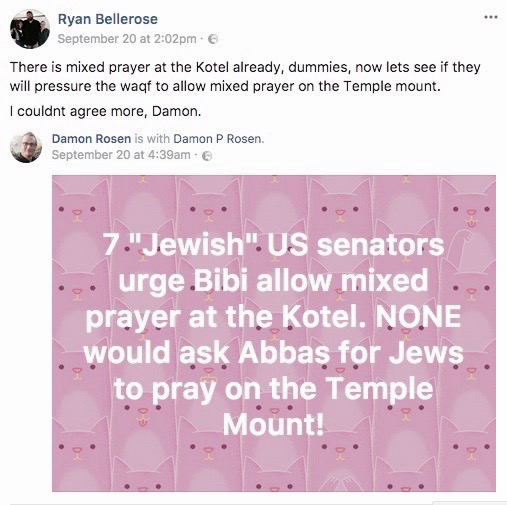Living in Israel, I have experienced the unfortunate reality that I cannot freely pray at the Kotel while wearing my tallit, unless I am prepared to risking being spat on or subjected to physical violence.
I struggle to comprehend why Orthodox women feel compelled to dictate whether other Jewish women should wear tallitot or wrap tefillin. Why should the practice of another person or another community interest them?
The Rabbis stated that women are not obligated to observe time-bound mitzvot (with the ironic exceptions of lighting Shabbat candles, immersing in the mikveh, and taking challah, which are all required of women and are definitely time-bound). However, the Rabbis never prohibited women from observing other commandments. In fact, the Talmud even mentions women who observed the mitzvot and it regards such actions positively. The daughters of Rashi, a renowned medieval commentator on the Talmud, wrapped tefillin. Were they considered anathemas? Certainly not!
 |
| Ryan has deleted all comments to this pos |
Ryan's underlying concern is the prohibition on Jews praying on the Temple Mount, which is indeed a significant issue. However, it is important to acknowledge that we cannot democratically change this reality. In 1967, Israel regained control of Jerusalem, which had been conquered and occupied by Jordan in 1949. As part of a diplomatic resolution, Israel entrusted Jordanian Islamic authorities with control over the Dome of the Rock and the Al-Aqsa mosque. Prayer at the Western Wall, which is located below the Temple Mount, falls within the purview of Israeli democracy.
There is no valid reason for Damon Rosen to falsely claim that everything is perfectly satisfactory at the Kotel nor should he denigrate non-Orthodox Jews by referring to them as 'Jewish-in-quotes.’
Our sages, Chazal, asserted that the destruction of the Temple was a consequence of baseless hatred among Jews, and sadly, such hatred exists today. Damon's words only fuel the fires of animosity.
During the High Holy Days, while I was in the United States, I was free to wear my tallit in public as I prayed as a Jew. It was a personal and meaningful experience that did not harm anyone and felt right. However, living in Israel, I will not be able dance with a Torah scroll on Simchat Torah this year, a holiday that signifies our joy in receiving the Torah. This limitation is due to the influence of right-wing Orthodoxy on practices and norms here.
In all other areas of Israeli life, diversity is accepted and we celebrate our shared heritage. Divisions that affect our spiritual lives are a real anathema.
 |
| Looking over the mehitza, stealing a siddur, and desecrating it! |
No comments:
Post a Comment
Thank you for commenting! I enjoy hearing from my readers and getting a chance to see their blogs, too!